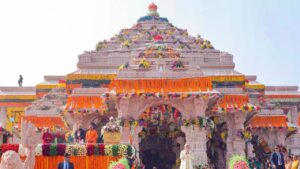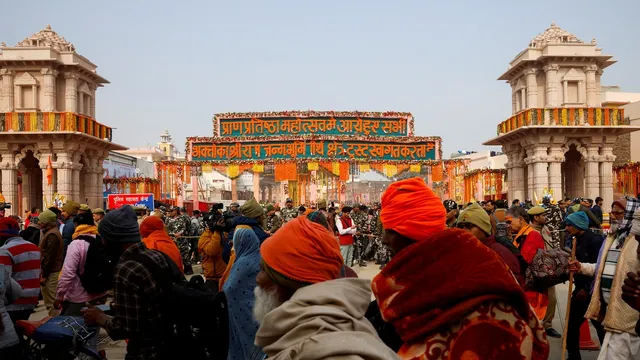News Desk, Kolkata :
Harmony Amidst Strife: India’s Ongoing Quest for Secular Unity ;
In the diverse tapestry of India, where cultures intertwine and histories converge, the delicate balance of communal harmony faces a crucial test. Recent developments underscore the urgent need for governmental intervention to navigate the labyrinth of disputes between the Muslim and Hindu communities, as religious tensions threaten to unravel the secular fabric woven into the nation’s identity.

Against the backdrop of historical and religious significance, the Ayodhya Dispute looms large, a symbolic battleground that encapsulates the broader struggle for coexistence. The comments of Panakkad Sayid Sadiq Ali Shihab Thangal, a respected Muslim spiritual leader, have added a new layer to the discourse. His assertion that the construction of the Ram temple and the proposed Babri Masjid in Ayodhya would strengthen secularism sparked a heated debate, drawing reactions from various political factions in Kerala.
The evolving narrative paints a picture of leaders from both communities urging the government to intervene and mediate, emphasizing the paramount importance of upholding the nation’s secular nature as enshrined in the Indian Constitution. Mosques, often at the center of these disputes, become symbols of a broader struggle for religious freedom and tolerance.

As concerns about the erosion of secularism intensify, the call for peaceful coexistence and mutual respect among India’s diverse religious groups echoes louder. Prominent Muslim leaders are at the forefront, pressing the Indian government to safeguard places of worship and resolve disputes before they escalate into broader conflicts. The nation stands at a crossroads, and the government’s reaction to these calls for action will be pivotal in shaping the future of communal relations.
In this intricate dance between tradition and modernity, leaders grapple with the responsibility of preserving a delicate equilibrium. The complexities of religious and political narratives in states like Kerala reflect the nuanced nature of the challenge at hand. The interplay of diverse perspectives and the dynamism of public discourse contribute to the evolving story of India’s secular experiment.
Recent updates indicate a growing sense of urgency as leaders intensify their efforts to bridge the divide. Interfaith dialogues, led by influential figures from both communities, aim to foster understanding and tolerance. Grassroots initiatives, driven by civil society, seek to build bridges of empathy, transcending religious affiliations. These endeavors symbolize a collective determination to preserve the pluralistic essence of India.
Yet, the looming specter of the Ayodhya Dispute continues to cast a shadow over these efforts. The recent reiteration of the call for a resolution reflects the enduring impact of this longstanding conflict on the national psyche. The government’s response becomes crucial in shaping not only the outcome of the Ayodhya Dispute but also the trajectory of secularism in India.
As the nation grapples with these challenges, it becomes imperative to revisit the fundamental principles that underpin the Indian Constitution. The delicate dance between religious freedoms and the commitment to secularism requires a nuanced approach. Leaders must navigate this terrain with sensitivity, acknowledging the diverse tapestry of beliefs woven into the fabric of the nation.
In the crucible of India’s diverse mosaic, the onus lies heavily on the government to safeguard the principles of secularism. The preservation of communal harmony is not just a political imperative but a moral obligation. The nation watches, holding its breath, as leaders chart a course towards a future where diversity is not a source of division but a celebration of unity.
In the unfolding narrative of India’s secular experiment, the Ayodhya Dispute stands as a testament to the challenges that accompany the pursuit of unity in diversity. The government’s response will be etched into the annals of history, determining whether India emerges stronger, more resilient, and true to its commitment to secularism or succumbs to the divisive forces that threaten to undermine its very foundation.
DISCLAIMER
Our news media denounces any form of bias and disapproves of sensationalism. The disseminated news is entirely educational and aimed at social awareness. Our media maintains absolute impartiality, adhering solely to the purpose of education and social consciousness.


